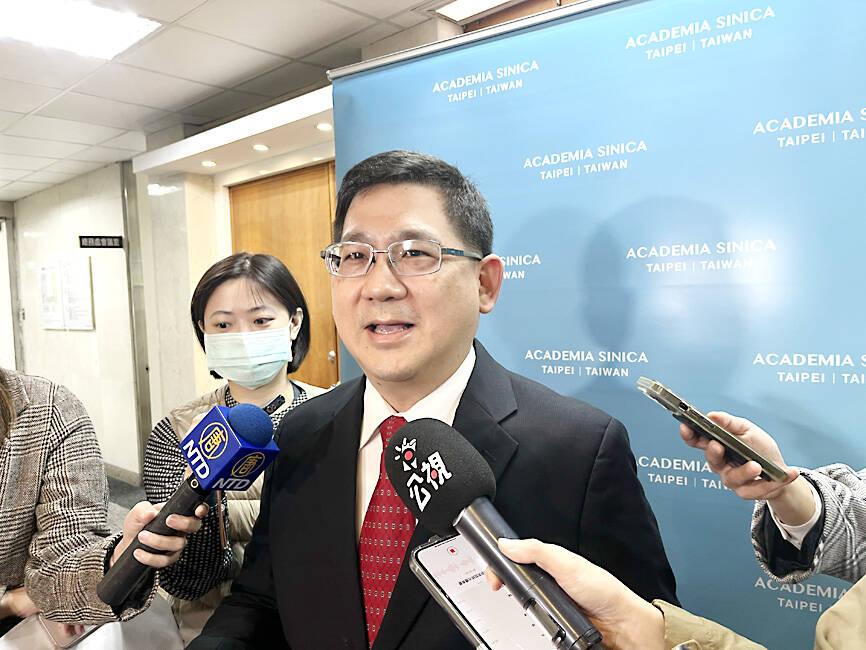Taiwan’s GDP should grow 3.02 percent next year due to higher exports driven by demand for emerging technologies such as artificial intelligence applications, Academia Sinica, the nation’s top research institute, said on Thursday.
The nation’s economy is to benefit from rising private investment led by a rebound in exports of information and electronic devices, as well as continued growth in private consumption, the institute said.
Should the forecast be accurate, it would top the 1.34 percent GDP growth anticipated by the institute for this year.

Photo: Hsu Tzu-ling, Taipei Times
The institute has twice revised its forecast for this year’s growth downward since projecting 2.41 percent real growth forecast for the year at the end of last year.
It revised that to 1.56 percent in July and then to 1.34 percent yesterday, citing a weakened global economy affected by fragile demand from end-users and bloated inventories that are still being drawn down.
The institute’s forecasts were slightly more cautious than those made by the government.
The Directorate-General of Budget, Accounting and Statistics (DGBAS) last month forecast that the nation’s GDP would grow 1.42 percent this year and 3.35 percent next year.
Lin Chang-ching (林長青), an adjunct research fellow at Academia Sinica’s Institute of Economics, said that exports, investment and consumption are all expected to drive the nation’s GDP growth next year, when the “local economy will see the spring arrive as the snow melts.”
Next year, the nation’s merchandise and service exports are expected to grow 6.23 percent after a 4.39 percent decline anticipated for this year, while imports are to grow 8.03 percent next year, compared with a predicted drop of 5.07 percent this year, he said, citing research by his department.
Solid demand for emerging tech applications and consumer electronics should spark the rebound in exports next year, he said.
Investment would also be higher as IT and electronics manufacturers invest in expanding capacity to meet stronger demand and the private sector invests more in green energy development to cut carbon emissions, he said.
Because of those factors, Academia Sinica forecast the nation’s private investment would grow 3.05 percent next year after a 9.70 percent decline anticipated for this year, with fixed capital formation to rise 4.23 percent next year from an anticipated 7.35 percent decline this year.
Academia Sinica also expected the nation’s private consumption to grow 3.01 percent next year, after an expected 8.32 percent increase this year, anticipating that greater cross-border travel, a 4.05 percent hike in the minimum wage and a 4 percent wage hike for government employees would boost spending.
While the nation’s economy would improve next year, the global economy remained vulnerable to uncertainties that could affect local growth, including downside risks of the Chinese economy and escalating trade tensions between Washington and Beijing, Lin said.
When asked about a move by China to suspend preferential tariff treatment for imports of 12 Taiwanese petrochemical products starting on Jan. 1, he said the impact would be limited.

Taiwan Semiconductor Manufacturing Co (TSMC, 台積電) would not produce its most advanced technologies in the US next year, Minister of Economic Affairs J.W. Kuo (郭智輝) said yesterday. Kuo made the comment during an appearance at the legislature, hours after the chipmaker announced that it would invest an additional US$100 billion to expand its manufacturing operations in the US. Asked by Taiwan People’s Party Legislator-at-large Chang Chi-kai (張啟楷) if TSMC would allow its most advanced technologies, the yet-to-be-released 2-nanometer and 1.6-nanometer processes, to go to the US in the near term, Kuo denied it. TSMC recently opened its first US factory, which produces 4-nanometer

GREAT SUCCESS: Republican Senator Todd Young expressed surprise at Trump’s comments and said he expects the administration to keep the program running US lawmakers who helped secure billions of dollars in subsidies for domestic semiconductor manufacturing rejected US President Donald Trump’s call to revoke the 2022 CHIPS and Science Act, signaling that any repeal effort in the US Congress would fall short. US Senate Minority Leader Chuck Schumer, who negotiated the law, on Wednesday said that Trump’s demand would fail, while a top Republican proponent, US Senator Todd Young, expressed surprise at the president’s comments and said he expects the administration to keep the program running. The CHIPS Act is “essential for America leading the world in tech, leading the world in AI [artificial

REACTIONS: While most analysts were positive about TSMC’s investment, one said the US expansion could disrupt the company’s supply-demand balance Taiwan Semiconductor Manufacturing Co’s (TSMC, 台積電) new US$100 billion investment in the US would exert a positive effect on the chipmaker’s revenue in the medium term on the back of booming artificial intelligence (AI) chip demand from US chip designers, an International Data Corp (IDC) analyst said yesterday. “This is good for TSMC in terms of business expansion, as its major clients for advanced chips are US chip designers,” IDC senior semiconductor research manager Galen Zeng (曾冠瑋) said by telephone yesterday. “Besides, those US companies all consider supply chain resilience a business imperative,” Zeng said. That meant local supply would

Servers that might contain artificial intelligence (AI)-powering Nvidia Corp chips shipped from the US to Singapore ended up in Malaysia, but their actual final destination remains a mystery, Singaporean Minister for Home Affairs and Law K Shanmugam said yesterday. The US is cracking down on exports of advanced semiconductors to China, seeking to retain a competitive edge over the technology. However, Bloomberg News reported in late January that US officials were probing whether Chinese AI firm DeepSeek (深度求索) bought advanced Nvidia semiconductors through third parties in Singapore, skirting Washington’s restrictions. Shanmugam said the route of the chips emerged in the course of an